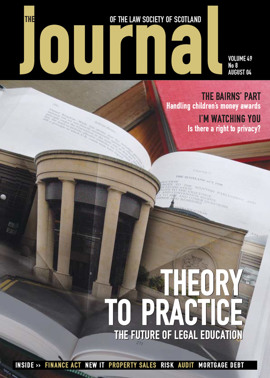Plain English has landed
Those of us who practise in the employment tribunal will need to be on the ball in the coming months, particularly so from 1 October 2004, the date on which the Employment Tribunals (Constitution and Rules of Procedure) Regulations 2004 (SI 2004/1861) come into force. The rules were laid before Parliament on 20 July 2004 and should have appeared on the HMSO website by the time this article is published.
Significant changes are made to the current rules, not least of which is that one set will apply across the whole of Great Britain, replacing the two distinct sets of provisions which exist at present for Scotland and England & Wales. While the rules have been restructured and rewritten into “plain English”, the number jumps from 23 to 61!
Claimants v Respondents
“Applicants” will become known as “claimants”, but “respondents” will retain their moniker. This has come as a surprise to many, as a change to “defendant” and/or “defender” had been championed by the Presidents of the Employment Tribunals and Employment Appeals Tribunal. However, it makes sense given that from October “claim” and “response” forms will replace IT1s and IT3s. These forms become mandatory from 6 April 2005.Grievances first
The main change in terms of the time limit for lodging a claim is brought about by the Employment Act 2002 (Dispute Resolution) Regulations 2004 which require that, where the Regulations apply, a claimant must raise a grievance prior to being allowed to lodge a tribunal claim. Once the potential claimant has lodged the grievance they must wait 28 days before lodging a tribunal claim, the intention being that employers will have time to deal with the grievance and matters would be resolved without resort to tribunal action. In certain circumstances the time limit for lodging a claim will be extended by three months, including where an employee submits a claim that is inadmissible because they have not lodged grievance proceedings first.Respondents will have an extra few days in which to lodge their response. Currently respondents have 21 days from the date on which they receive a copy of the IT1. This will change to 28 days from the date on which they are sent a copy of the claim.
Acas backs off
Acas currently has a duty to continue to conciliate for as long as the parties in dispute want to continue. This practice will end. An ongoing duty will only subsist in certain types of case, namely those involving the issues of equal pay, discrimination or protected disclosures. In all other cases there will be either a fixed seven or 13 week period – depending on the subject matter of the case – which starts as soon as the Secretary sends the claim to the respondent. After the fixed period expires Acas will have the power to conciliate, but will not be under a duty to do so.Expenses and preparation time
Expenses will continue to be available to cover the legal costs of a party who is legally represented at a hearing, and preparation time awards will be introduced for a party who is not legally represented, for example a claimant representing him or herself, or an HR manager conducting the case for a respondent. An award of up to £25 per hour can be made for “preparation time”.There will also be the introduction of a whole new beast in the form of “wasted costs orders”, whereby a representative will be held personally liable for costs incurred if his or her own conduct is deemed improper, unreasonable or negligent. Such awards could be made in favour of your own client and could include costs not yet billed being disallowed or costs already paid being ordered to be repaid.
Not so public
At present details of claims and judgments are entered in the public register which is open for all to view. This will cease to be the case from October. Disadvantages cited during the consultation included compromising the privacy of parties and leaving them open to numerous unwelcome approaches from “ambulance chasers”. Details of judgments will still be recorded, but cases will not appear if settlement is agreed before a decision is issued.Be prepared!
With 1 October 2004 bringing us new employment tribunal rules, the Dispute Resolution Regulations, new EAT rules, a new Acas Disciplinary and Grievance Code of Practice and new “claim” and “response” forms, the potential for mishaps is evident and you would be best advised to start preparing early.Postscript – Dunnachie reversed
On 15 July the House of Lords upheld the appeal in Dunnachie v Kingston-upon-Hull CC, therefore injury to feelings awards will not be competent in unfair dismissal cases.
Jane Fraser, Head of Employment, Pensions & Benefits, Maclay Murray & Spens
In this issue
- Making the system work
- Sole survivors?
- Firm foundations
- The paper trail
- Private lives in public
- IT: what next?
- Roll again
- Destiny's child
- The great day comes
- SOX education
- Peer review: staying on target
- Obituary: James D Wheelans, CBE
- Obituary: JAMES D WHEELANS, CBE (1)
- Time, gentlemen?
- Plain English has landed
- Tangle o' the Isles
- Hunting down the pirates
- Scottish Solicitors' Discipline Tribunal
- Website reviews
- Book reviews
- How much law, anyway?
- FSA's net widens






